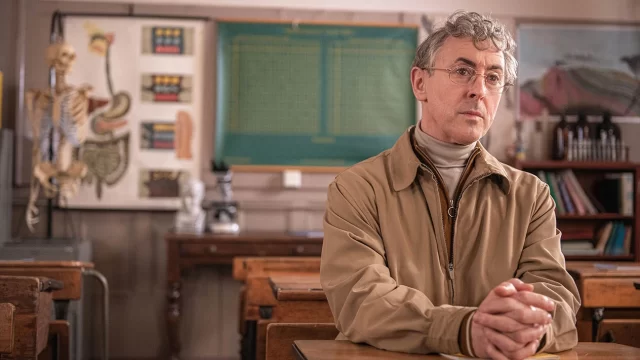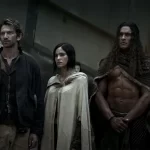My Old School: Heard About the Whole Affair, by David Bax

If you only know one thing about Jono McLeod‘s My Old School, it’s probably the fact that Alan Cumming is involved. His face is front and center on every bit of promotional art, so much so that you may be surprised to learn that the movie is a documentary. Cumming’s participation and talents are a major part of McLeod’s vision but I would urge you not to learn too much more about the movie. Just go see it.
Quick word of warning, though. If you’re like me, you’ll probably find yourself on guard and wary when the movie starts with a surfeit of big, bright text and is replete with flat-looking animation. “Wait a minute,” you’ll say (as I did to myself), “is this one of those cute documentaries?!”
Admittedly, yes, My Old School is a bit cute. But, as with Jonas Poher Rasmussen‘s Flee from last year, there is a justifiable reason for the animation element that only adds to the intrigue. Just like in Flee, the chief subject of McLeod’s documentary agreed to be interviewed but refused to let his face be shown. Instead of rotoscoping him, though, McLeod simply hired Cumming to lip sync the interview and physicalize the man into a character.
And that’s what he is to the movie, a character. He’s the subject but he’s not exactly the protagonist. In keeping with the comparisons to Flee, McLeod has a connection to this man and to the events described. Unlike Rasmussen and the pseudonymous Amin, though, McLeod and “Brandon” are not friends. He’s simply an ongoing source of fascination for McLeod and his former classmates, who make up the rest of the interviewees in My Old School and collectively represent the film’s point of view better than McLeod or Brandon do on their own. They are the interested humans in this human interest story.
My Old School contains a lot of shots of these former boys and girls, now men and women, engaging in one-on-one interviews or gathered into small groups, laughing. It all adds to the movie’s overriding sense of fun. But it’s hard to ignore the fact that, more often than not, they’re laughing at Brandon. Without revealing details, I’ll acknowledge that they are not without reason for doing so. But the fact remains that McLeod only really allows the views of his classmates to color how we feel about Brandon, despite the man’s participation. Perhaps he would better be described as the movie’s object rather than its subject.
Yet the movie never exactly feels mean-spirited. Its success lies in the way that it recreates the experience of getting together with old friends and reminiscing, repeating the things you all remember with clarity and debating the details on which your memories differ. But always laughing, in thrall to the power of the past to keep us banded together.





























